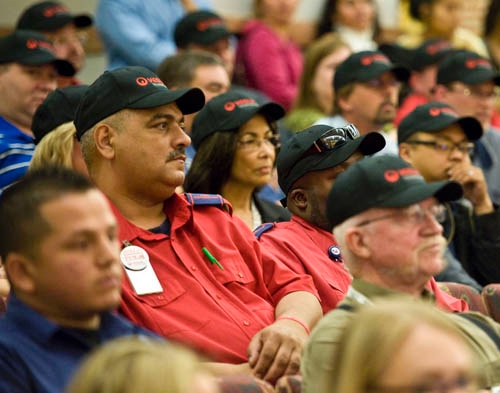First Transit wins Las Vegas Valley bus contract
Lengthy discussions about who should land a lucrative bus contract Thursday centered around baseball analogies and in the end, it was First Transit that smacked a walk-off home run in extra innings on what appeared to be Veolia's home turf.
After more than five hours of watching big-time politicians and attorneys make their pitch and Regional Transportation Commissioners often duck, the standing-room only crowd -- mostly Veolia Transportation employees -- muttered with disappointment as they filed out of the chambers.
The commissioners opted to bench Veolia in favor of First Transit, whose bid over a seven-year period was $50 million less than the 19-year incumbent's. The vote means that First Transit will operate the fixed-route transit system for at least three years. The contract is worth $86 million the first year, including $2.8 million in start-up costs; $87 million for the second year; and $89 million for the third.
After that, the board will revisit the issue, possibly splitting services between different companies.
To the passenger, the change in operators come October will mean little. In fact, according to RTC general manager Jacob Snow, it will likely benefit them. While the transportation commission will have to cut some services because of falling sales tax revenue, the reductions won't be nearly as severe because of First Transit's lower cost.
Had Veolia secured the contract, the commission would have had to cut 100,000 service hours. Routes to Laughlin, Mesquite and Boulder City as well as a couple urban lines might be eliminated.
To the employees, the change only means more anxiety. Drivers and mechanics, who are members of the Amalgamated Transit Union, rallied behind Veolia.
They fear their salaries and benefits will be sacrificed in order for First Transit to fulfill the financial commitments made in the contract.
"This is devastating," said driver Thomas Vukdelich. "The whole transit system is state of the art and that's been done under Veolia's watch. All their revenue guarantees are good for us and good for them."
The game-ending blow Thursday might have been delivered by Bruce Woodbury, a former Clark County commissioner and ex-chairman of the transportation board who is viewed by many as the pioneer of the Las Vegas Valley's transit system. Woodbury, now a consultant for First Transit, acknowledged he was reluctant to get involved with the issue, but believed First Transit's offer was superior.
"We always trusted Jacob Snow to make wise and productive decisions," Woodbury said. Snow and his staff had recommended First Transit be awarded the contract.
Woodbury said if Veolia was awarded a new deal, the message to potential operators in the future would be clear: "In Clark County, Nevada, the door is closed to competition and a virtually permanent monopoly has been established."
Ironically, Woodbury played a role in delivering Veolia the contract in 1993.
"Times change and circumstances change," he said. "Today's economic circumstances demand a change."
In a 4-3 vote, commissioners Roger Tobler, Debra March, Robert Eliason and David Bennett supported First Transit's bid. Commissioners Larry Brown, Chris Giunchigliani and Steve Ross voted instead to rebid the contract, voicing concerns that the playing field was uneven. Las Vegas Mayor Oscar Goodman resigned early from the commission and his replacement, Lois Tarkanian, was unable to attend the meeting.
First Transit representatives said they will retain 98 percent of the current staff, as long as employees pass drug and alcohol tests. In addition, they said they will offer workers a minimum of 3 percent salary increases in the first year.
They said their profit would be $10 million less than Veolia's over a seven-year period, raising concerns among commissioners that Veolia was overcharging to pad its profits.
First Transit also offered the commission an incentive to pay at the beginning of the month rather than the end. The 1 percent savings would be passed on to the board and it would amount to about $800,000 a year. New technology that would result in more efficient fuel consumption will save the company about $500,000 a year.
"We're not new at this. We know what we are doing," said Brad Thomas, president of First Transit. "The assumption being made today is that the only way to run the service is how it has been run. I think that is a bit suspect."
Jeremy Aguero, the outside financial analyst hired to review First Transit's figures, said the company is able to perform the necessary services with their lower bid.
"First Transit's proposal clearly reflects a belief that its management can achieve labor and maintenance savings compared to current costs and compared to other would-be service providers," Aguero said. "Importantly, the overall cost provided in First Transit's proposal is not inconsistent with comparable costs in other markets and they make the cost assumptions at their own risk."
Attorney Chris Kaempfer, who represented Veolia, questioned how the bidding categories were scored and weighted.
For example, First Transit listed a $450,000 savings in overhead costs because it also runs the Regional Transportation Commission's Para Transit system; they could combine administrative positions. Veolia doesn't have that luxury because it only has one contract.
Brown unsuccessfully made a motion to rebid the contract to ensure the requirements and conditions in the request for proposals was fair. Commissioners also discussed waiting for the Para Transit contract to expire before choosing a new operating company.
Eliason and Tobler explained that all government jurisdictions are being forced to make difficult and unpopular decisions because of the economy. They pleaded with their colleagues to not delay and move forward with a vote.
"We have confidence in our staff and we have a recommendation," Tobler finally said. "Even if it's not a comfortable one."
Contact reporter Adrienne Packer at apacker@reviewjournal.com or 702-387-2904.




























